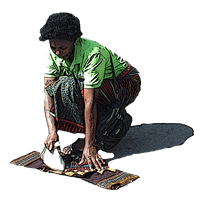Domestic work is work. Domestic workers are workers.


Domestic work is defined as “work performed in or for a household or households” (ILO Convention 189).
Under the Convention, a domestic worker is “any person engaged in domestic work within an employment relationship”.
Generally speaking, domestic workers provide personal and household care.
The tasks that are considered to be domestic work vary across countries; they may include cooking, cleaning, taking care of children, the elderly and people with disabilities, gardening, guarding pets, or driving for the family.
A domestic worker may work on full-time or part-time basis; may be employed by a single household or by multiple employers; may be residing in the household of the employer (live-in worker) or may be living in his or her own residence (live-out). A domestic worker may be working in a country of which she/he is not a national.

The services that the domestic workers provide to families have been determined to be vital for the sustenance of the economies of the sending countries and the receiving countries, as well as keeping families healthy and productive.
Domestic workers dedicate their efforts to enhance the well-being of their employers’ children and to ensure that the homes they manage are in perfect conditions.
This offers parents and homeowners the time and luxury they need to maintain their careers or pursue their education without any stress. The role that domestic workers play in the growth of any society cannot therefore be disputed.

How does COVID-19 Impact Us?
COVID-19 has drastically impacted the lives of domestic workers (DWs) all over the world, exacerbating their legal, social and economic situation in Africa, Asia, Europe, Latin America, Caribbean, North America and the Middle East and North Africa. There are clear similarities in the difficulties DWs are facing across the globe. However, there are contextual differences resulting from the responses governments have implemented in attempt to contain the outbreak of the virus, as well as according to their capacity and level of acknowledgement of the informal sector. Read more on the impact of COVID-19 on informal economy
Domestic workers are often left out of labor protection laws or systems and social security because of how domestic work is perceived: a manual form of labor, historically expected to be given for free by women in private households. DWs thus face multiple vulnerabilities because they are women from the global south, often coming from disadvantaged classes, and subjected to racism and xenophobia if they are migrants. DWs are left out of relief or assistance plans.
The main implications of COVID-19 on DWs:
- Domestic workers are facing the possibility of termination of employment or forced unpaid leave.
- Domestic workers that remain employed are not receiving their salaries.
- Live-out domestic workers are affected by loss of livelihoods that results in loss of access to basic necessities.
- Decreased demand for the workers since employers no longer receive them in their homes because of isolation measures. Racism contributes to the precarity of the situation since many domestic workers are migrants.
- Increased uncompensated workload.
- Inability to pay rent, risk of eviction and homelessness.
- Limited money resulting in unstable access to food and medication.
- Social-isolation measures threaten the availability of social connections and the possibility of easy access to community assistance and support
IDWF Solidarity Fund to Fight COVID-19
The IDWF and its affiliates are doing all we can to stand with our members and all domestic workers.
We have created a USD 2 million Solidarity Fund to support our actions aiming to:
- Protect jobs by providing protective gear to domestic workers so that they can go to work
- Connect with our members online
- Keep our affiliates offices open to members who need shelters
- Give out food and small cash to the members in critical situation
Support our Solidarity Fund!
Keep us safe and together we will be strong and keep our communities COVID-19-Free.
